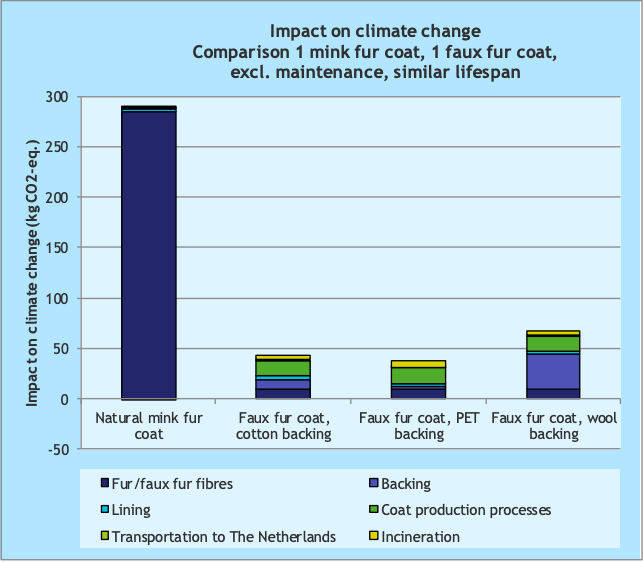Meet GACHA: a new biodegradable faux fur
ECOPEL has been creating faux fur products for years, helping the industry move away from cruel, animal-derived fur. Now, ECOPEL has gone a step further by creating a biodegradable faux fur, GACHA. This product benefits the planet, animals living on it, and the people who fairly make it. Fashion that’s better for the animals, planet and people is a big tick in our books and a step closer to total ethics fashion.
The problem with fur
Fur continues to decrease in popularity, and will likely be the first animal ‘material’ to fall completely out of fashion. While many bans on fur farming and sales across brands, fashion shows, cities and states continue to pass, there is still work to do as animals continue to suffer and be slaughtered for their fur.
All factory farmed for their fur, mink, foxes, chinchillas and racoon dogs suffer through painful and psychologically distressing lives. Almost all fur — around 95% — comes from these animals who are confined to unnatural, inhumane caged conditions vastly different from their expansive natural habitats. The stress of confinement sees foxes and mink resort to self-mutilation and even cannibalism . This is all endured before these wild animals are gruesomely killed — gassed or invasively electrocuted.
As for coyotes, lynx and raccoons, these free-living individuals are caught in steel traps before being shot. It is not uncommon for animals to chew their own legs off in order to escape these painful traps. There is no ethical animal fur in fashion.
Conventional fur alternatives
The fur industry not only harms animals themselves, but our planet and biodiversity. Despite common misconception, fur it is not biodegradable, even according to industry studies. Fur has been banned in some instances from being misleadingly labelled as ‘natural’, considering the use of toxic chemicals such as formaldehyde in the process of fur dressing.
Not only is fur dressing never ‘eco-friendly’, it also is no friend to the human workers who make fur products. Industry workers have been found to be at risk of eye irritation, cancer, and even death. Clearly animal-derived fur is a no-go, so let’s deep dive into faux fur.
Traditionally, fur alternatives are synthetics and while this protects fur-bearing animals, this is no perfect solution. Synthetics are generally fossil fuel derived, can cause micro plastic waste, and, as with fur, don’t biodegrade.
Despite this, faux fur is still shown to be better for the environment when considering the climate impact of animal and faux fur. While this — and faux fur’s lower eutrophication risks — is valuable, it’s important that we strive for materials that aren’t only more sustainable than their unsustainable counterparts, but that are truly sustainable — therefore protecting all life.
“While it’s already established that conventional polyester used to create faux fur has a smaller impact on the environment than animal-based fibers, ECOPEL is willing to reduce the environmental impact of faux fur.”
- ECOPEL
Faux fur improvements
As believers of this mindset, ECOPEL has been working towards this over the last few years. Their first improvement came with their recycled synthetic fur. They use post-consumer plastic bottles to create the material, and soon, will use plastic collected from the ocean, reducing this pollution. This is definitely a great step in the right direction, moving away from harmful synthetics while combatting plastic waste.
ECOPEL didn’t want to stop there though. They made the leap to a bio-based faux fur called KOBA — the first faux fur made with vegetal ingredients. KOBA is 37% plant-based, resulting in 30% less energy and a 63% greenhouse gas emission reduction during production. This allows ECOPEL to move further away from a reliance on fossil fuels but KOBA is still not biodegradable.
Introducing GACHA
Consistently committed to making the most sustainable faux fur possible, ECOPEL has now introduced their new biodegradable faux fur, GACHA. This is their most sustainable ‘fur’ to date and is commercially compostable in 180 days.
Being biodegradable is a huge step for the industry, providing a solution to problems of material end-of-life disposal. Instead of ending up in landfill or releasing toxic chemicals back into nature’s soil without actually degrading, GACHA can be broken down to the point of potential environmental replenishment.
There is always debate and criticism surrounding the sustainability of faux fur but now that there’s a cruelty-free and biodegradable option with GACHA, there is absolutely no reason to continue supporting animal fur.
The future of fur
With nearly 70% of the most profitable luxury fashion names such as Gucci, Chanel and Versace having already moved away from fur, and continued pressure for more fur bans across the industry,, it will be very exciting to see GACHA being used.
Fur will soon be nothing more than a sad memory of the past, with even European wide bans petitioned for and proposed right now. A the fashion industry moves towards faux fur, we need to make sure that we’re prioritising the well-being of animals, people and the planet equally in our material choices.





